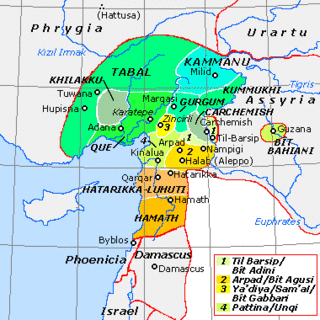Tabal may refer to:
- Tabal (region), a region of southern Central Anatolia during the Iron Age.
- Tabal (state), a Luwian-speaking Syro-Hittite petty kingdom that existed during the Iron Age.
Tabal may refer to:

The Bronze Age is a historic period, lasting from approximately 3300 BC to 1200 BC. It is characterized by the use of bronze, the use of writing in some areas, and other features of early urban civilization. The Bronze Age is the second principal period of the three-age system proposed in 1836 by Christian Jürgensen Thomsen for classifying and studying ancient societies and history. It is also considered the second phase of three, in the Metal Ages.
The Iron Age is the final epoch of the three historical Metal Ages, after the Copper and Bronze Ages. It has also been considered as the final Age of the three-age division starting with prehistory and progressing to protohistory. In this usage, it is preceded by the Stone Age and Bronze Age. These concepts originated for describing Iron Age Europe and the Ancient Near East, but they now include other parts of the Old World.
Kuru may refer to:

Canaan was a Semitic-speaking civilization and region of the Southern Levant in the Ancient Near East during the late 2nd millennium BC. Canaan had significant geopolitical importance in the Late Bronze Age Amarna Period as the area where the spheres of interest of the Egyptian, Hittite, Mitanni, and Assyrian Empires converged or overlapped. Much of present-day knowledge about Canaan stems from archaeological excavation in this area at sites such as Tel Hazor, Tel Megiddo, En Esur, and Gezer.
Tunna or Dunna was an ancient Anatolian city located at the foothills of the Taurus Mountains, near the town of Ulukışla and the Cilician Gates in southern Cappadocia.

Karijini National Park is an Australian national park centred in the Hamersley Ranges of the Pilbara region in the northwestern section of Western Australia. The park is located north of the Tropic of Capricorn, 1,055 kilometres (656 mi) from the state's capital city, Perth. Formerly known as Hamersley Range National Park, the park was officially renamed in 1991.

Tab was a diet cola soft drink produced and distributed by The Coca-Cola Company, introduced in 1963 and discontinued in 2020. The company's first diet drink, Tab was popular among some people throughout the 1960s and 1970s as an alternative to Coca-Cola. Several variations were made, including a number of fruit-flavored, root beer, and ginger ale versions. Caffeine-free and clear variations were released in the late 1980s and early 1990s.

Tabal, later reorganised into Bīt-Burutaš or Bīt-Paruta, was a Luwian-speaking Syro-Hittite state which existed in southeastern Anatolia in the Iron Age.

Tyana, earlier known as Tuwana during the Iron Age, and Tūwanuwa during the Bronze Age, was an ancient city in the Anatolian region of Cappadocia, in modern Kemerhisar, Niğde Province, Central Anatolia, Turkey.

The Mushki were an Iron Age people of Anatolia who appear in sources from Assyria but not from the Hittites. Several authors have connected them with the Moschoi (Μόσχοι) of Greek sources and the Georgian tribe of the Meskhi. Josephus Flavius identified the Moschoi with the Biblical Meshech. Two different groups are called Muški in Assyrian sources, one from the 12th to the 9th centuries BC near the confluence of the Arsanias and the Euphrates and the other from the 8th to the 7th centuries BC in Cappadocia and Cilicia. Assyrian sources clearly identify the Western Mushki with the Phrygians, but later Greek sources then distinguish between the Phrygians and the Moschoi.

Bronze Age swords appeared from around the 17th century BC, in the Black Sea and Aegean regions, as a further development of the dagger. They were replaced by iron swords during the early part of the 1st millennium BC.
Pomeranian is an adjective referring to the historical region of Pomerania, which is divided between Poland and Germany.
Adad-nārārī I, rendered in all but two inscriptions ideographically as mdadad-ZAB+DAḪ, meaning "Adad (is) my helper," was a king of Assyria during the Middle Assyrian Empire. He is the earliest Assyrian king whose annals survive in any detail. Adad-nārārī I achieved major military victories that further strengthened Assyria. In his inscriptions from Assur he calls himself son of Arik-den-ili, the same filiations being recorded in the Nassouhi kinglist. He is recorded as a son of Enlil-nirari in the Khorsabad kinglist and the SDAS kinglist, probably in error.
Tab Clear was a variation of Tab. It is Coca-Cola's contribution to the short-lived "clear cola" movement during the early 1990s. It was introduced in the United States on December 14, 1992, in the United Kingdom a month later and in Japan in March 1993 to initially positive results. Tab Clear was, however, discontinued after only a short time of marketing in 1994. Unlike most other "clear" soft drinks, Tab Clear contained caffeine and, according to the company, had the flavor of cola.

The Late Bronze Age collapse was a time of widespread societal collapse during the 12th century BC associated with environmental change, mass migration, and the destruction of cities. The collapse affected a large area of the Eastern Mediterranean and the Near East, in particular Egypt, eastern Libya, the Balkans, the Aegean, Anatolia, and, to a lesser degree, the Caucasus. It was sudden, violent, and culturally disruptive for many Bronze Age civilizations, and it brought a sharp economic decline to regional powers, notably ushering in the Greek Dark Ages.
Cybistra or Kybistra, earlier known as Ḫubišna, was a town of ancient Cappadocia or Cilicia.

The ancient Near East was the home of early civilizations within a region roughly corresponding to the modern Middle East: Mesopotamia, ancient Egypt, ancient Persia, Anatolia and the Armenian highlands, the Levant and the Arabian Peninsula. The ancient Near East is studied in the fields of ancient Near East studies, Near Eastern archaeology, and ancient history.

Ḫartapus or Kartapus was an Anatolian king who in the early 8th century BCE ruled a state in what is presently the region of Konya in modern Turkey.

Coronavirus Australia was an app released by the Australian Government designed to allow users to access information about the COVID-19 pandemic in Australia. The app was released by the Department of Health on 29 March 2020, and decommissioned two years later on 31 August 2022. Over its lifetime, the app was downloaded over a million times and was initially ranked first in the Apple App Store's "Health and Fitness" category. Due to the short development period of two weeks, the app initially served primarily as an aggregate of links to official government websites. Shortly after an update was released adding a voluntary "isolation registration" form that collected the location, name, age, mobile phone number, isolation start date, and various other details about users who were self isolating.

The Samsung Galaxy Tab S8 is a series of Android-based tablets designed, developed and marketed by Samsung Electronics. Unveiled at Samsung's Galaxy Unpacked event on 9 February 2022, they serve as the successor to the Galaxy Tab S7 series.